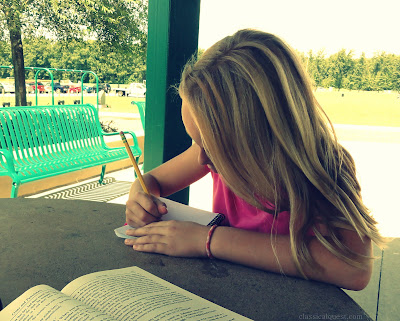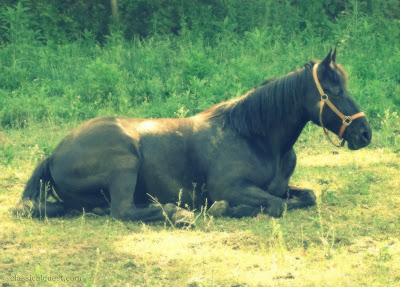by Adriana
Note to Myself:Following The Well-Educated Mind does not mean merely reading through a list of Great Books and underlining the stuff I like! There are questions I must answer! This is "The Great Books Workout," not a stroll in the park!
Crime and Punishment
by Fyodor Dostoevsky
by Fyodor Dostoevsky
Warning! This Post Contains Spoilers!
Law school drop-out, Rodion Raskolnikov, has a theory: Some men are "extraordinary"; others are merely "ordinary". "Extraordinary" men (like Napoleon, for example) need not follow the same laws as ordinary men because they are above the law. Raskolnikov thinks he is one of these Napoleonic, demi-god types. To test his theory, he commits murder. Yet instead of triggering a rise to greatness, his action causes him to dive into a heinous downward spiral. We follow his internal punishment and witness the weight of his transgression throughout most of the novel. The thing that bothers him most? He's not Napoleon after all.
Inquiry:
What is the inciting incident? For Raskolnikov, the point of no return is the scene in which he murders an elderly pawn broker, Alyona Ivanova, and her sister, Lizaveta, with an axe.

Can you identify the climax? Yes. I think everything in this novel hinges on the moment when Raskolnikov, a murderer, confesses to Sonia, a pious prostitute. I anticipated the scene quite anxiously. Every time they were alone together I thought, Now?; all the falling action of this novel occurs after this moment.
Suddenly a strange, unexpected feeling of corrosive hatred for Sonya came over his heart. As if surprised and frightened by this feeling, he suddenly raised his head and looked at her intently, but he met her anxious and painfully caring eyes fixed upon him; here was love; his hatred vanished like a phantom. That was not it; he had mistaken one feeling for another. All it meant was that the moment had come. Part V, Chapter IV
What is the author's argument? If you feel the urge to prove you are a demi-god, kindly leave your axe at home.
Dostoyevsky's letter to Katkov reveals his immediate inspiration, to which he remained faithful even after his original plan evolved into a much more ambitious creation: a desire to counteract what he regarded as nefarious consequences arising from the doctrines of Russian nihilism.
Russian what?
The Nihilist movement was a Russian movement in the 1860s which rejected all authorities. It is derived from the Latin word "nihil", which means "nothing". After the assassination of Tsar Alexander II in 1881, the Nihilists were known throughout Europe as proponents of the use of violence in order to bring about political change. source
Ayiyi!
Did the author lay out facts to support his purpose? Yes. Raskolnilov did not become the Napoleonic Übermensch he thought he would become when he defied the law and pursued what he had considered a "higher purpose". Killing the pawnbroker and her sister caused him to completely unravel.
Did the author succeed or fail? Well, I suppose that yes, he made his purpose clear. I'm convinced that murdering someone to prove a point to oneself is delusional, absurd, base, and vile.
Logic:
What does the writer want me to believe?
The only thing that truly sets individuals apart as extraordinary is self-sacrifice. Our heroine, Sonia Marmeladova, consistently sacrificed for others in this story. Dostoevsky used her as a type of Christ. I loved her character because of her Christ-like attributes.
Also, there was something else I think Dostoevsky wanted me to believe (which is, in fact, something I do believe). The following is a quote about the protagonist Raskolnikov from Dostoevsky's close friend, Vladimir Solovyov:
Raskolnikov's] boundless self-confidence must disappear in the face of what is greater than himself, and his self-fabricated justification must humble itself before the higher justice of God.Oh. That's good. Now read it again in the first person:
My self-fabricated justification must humble itself before the higher justice of God. If I had to distill Crime and Punishment down to one simple moral, this is it.
What does the writer want me to experience? Tragedy and redemption. A graphic, intimate exploration of a murderer's thoughts, insight into his bizarre motive.
Am I convinced? Yes. Though the setting of this of this novel was sad and creepy, I can see how the breaking down of a person's world view can create profound confusion and lead to tragedy. It was a hard read because it was so dark, but the redemptive ending provided hard earned relief. One of the best endings I've read. Ever.
Have I experienced what writer wants me to experience? I believe so. I experienced the dingy tenements, backstreets and poverty of pre-revolutionary St. Petersburg. I've experienced the psychology of a tortured soul. I've discovered intense purity in an unlikey person (Sonia Marmeladova) and I've witnessed the healing power of self-sacrifice and confession.

























































